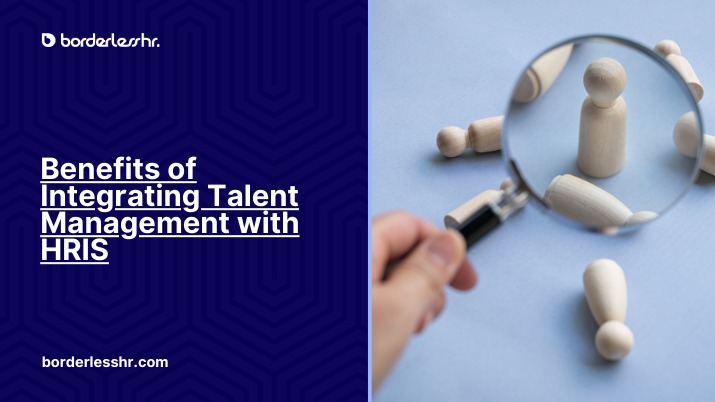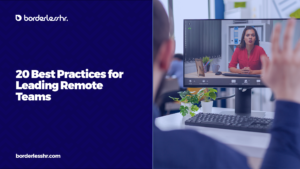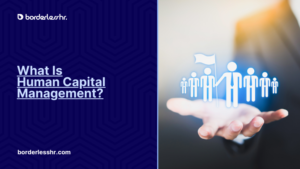In today’s business world, managing people is important for a company to succeed. The way companies handle their employees has changed a lot over time, especially with the help of technology. One big change we see is in Talent Management integration with Human Resource Information Systems (HRIS). This helps companies manage their employees better, which makes the company grow and work better.
Talent management is about finding, training, and keeping the best employees. It includes hiring new people, helping them do well in their jobs, and planning for when they leave or get promoted.
HRIS is software that helps with HR tasks like paying employees, managing their benefits, keeping track of their work hours, and making sure the company follows all the rules. When these two things work together, companies get a lot of benefits that make managing employees easier and better for the company.
Benefits of Talent Management Integration with HRIS
Streamlined Processes and Efficiency
Integration of Talent Management with HRIS eliminates redundant tasks and streamlines processes across the employee lifecycle. From recruitment to onboarding, performance evaluation, and talent development, all data and workflows are seamlessly connected within a single platform. This reduces administrative burden, minimizes manual errors, and accelerates the pace of HR operations, allowing HR professionals to focus on strategic initiatives rather than routine tasks.
Enhanced Data Visibility and Analytics
By consolidating talent data within the HRIS, organizations gain comprehensive visibility into their workforce metrics. They can access real-time information on employee performance, skills, training needs, and career aspirations. Advanced analytics tools embedded within the HRIS enable HR managers to derive actionable insights from this data, facilitating informed decision-making. Whether it’s identifying high-potential employees, forecasting staffing requirements, or assessing training effectiveness, data-driven insights drive organizational effectiveness and agility.
Improved Recruitment and Onboarding
Integrating Talent Management with HRIS transforms the recruitment and onboarding processes into a seamless, automated experience. Recruitment workflows can be standardized, from job posting and candidate screening to interview scheduling and offer generation. Once hired, new employees’ data seamlessly flows into the HRIS, automating onboarding tasks such as paperwork, orientation training, and provisioning of resources. This not only enhances the candidate experience but also accelerates time-to-productivity, ensuring new hires quickly assimilate into their roles.
Strategic Succession Planning
Effective succession planning is critical for organizational resilience and sustainability. By integrating talent data with HRIS, companies can identify high-potential employees and cultivate a pipeline of future leaders. The system can track employees’ career progression, performance ratings, and competency assessments, aiding in the identification of suitable candidates for key roles. Moreover, HRIS can facilitate talent mobility by matching internal candidates with suitable opportunities, thereby reducing dependency on external hires and fostering a culture of internal growth.
Personalized Learning and Development
Employee development is a cornerstone of talent management, and integration with HRIS enhances the effectiveness of learning initiatives. By leveraging employee data stored in the HRIS, organizations can personalize training and development programs based on individual skills gaps, career goals, and learning preferences. Whether it’s e-learning modules, mentoring programs, or on-the-job training, tailored development plans ensure employees acquire the skills needed to excel in their current roles and prepare for future responsibilities.
Enhanced Performance Management
Traditional performance appraisals often suffer from subjectivity, bias, and lack of timely feedback. Integrated Talent Management with HRIS facilitates continuous performance management practices, enabling ongoing feedback, goal setting, and performance tracking throughout the year. Managers can access real-time performance data, track goal progress, and conduct meaningful performance discussions with employees. This fosters a culture of accountability, transparency, and employee engagement, ultimately driving performance improvement across the organization.
Compliance and Risk Mitigation
Compliance with labor regulations and industry standards is a critical aspect of HR management. HRIS equipped with compliance features ensures adherence to legal requirements, such as payroll tax calculations, labor law compliance, and reporting obligations. By automating compliance-related tasks and providing audit trails, integrated systems reduce the risk of errors, penalties, and litigation. Moreover, centralized data storage enhances data security and confidentiality, ensuring compliance with data protection regulations like GDPR and CCPA.
Cost Savings and ROI
While the initial investment in integrating Talent Management with HRIS may seem significant, the long-term benefits outweigh the costs. By streamlining processes, reducing manual efforts, and improving resource utilization, organizations achieve significant cost savings in HR administration. Moreover, the enhanced efficiency and productivity resulting from integrated systems translate into tangible ROI through improved employee performance, reduced turnover costs, and better alignment of talent strategies with business objectives.
How HRIS Can Support Talent Management
HRIS plays a crucial role in supporting talent management strategies within organizations. Here are five ways HRIS can effectively support talent management:
Recruitment and Applicant Tracking: HRIS streamlines the recruitment process by automating job postings, application tracking, and candidate screening. It allows HR professionals to easily manage applicant information and track their progress through the hiring pipeline. With features like resume parsing and candidate scoring, HRIS enables organizations to identify top talent more effectively.
Performance Management and Feedback: HRIS facilitates ongoing performance management by providing a platform for setting goals, conducting performance evaluations, and providing feedback. Managers can track employee progress, document performance metrics, and schedule regular check-ins through the system. Additionally, HRIS often includes features for peer feedback and 360-degree reviews, fostering a culture of continuous improvement and development.
Learning and Development: Talent management involves nurturing employee skills and competencies to enhance their performance and career progression. HRIS supports learning and development initiatives by offering tools for creating training programs, tracking employee participation, and assessing learning outcomes. Integration with learning management systems (LMS) allows employees to access training materials conveniently and enables HR to monitor their progress.
Succession Planning: HRIS helps organizations identify and groom future leaders through effective succession planning. By maintaining a comprehensive database of employee skills, qualifications, and career aspirations, HRIS enables HR professionals to identify high-potential employees and create development plans to prepare them for leadership roles. With succession planning tools, organizations can mitigate talent gaps and ensure continuity in key positions.
Analytics and Reporting: HRIS provides valuable insights into workforce trends and performance metrics through robust analytics and reporting capabilities. HR professionals can generate customized reports on various talent management indicators such as employee turnover and retention rate. These insights enable data-driven decision-making, helping organizations optimize talent strategies and align them with business objectives.
Conclusion
In conclusion, integrating Talent Management with HRIS is a strategic imperative for organizations seeking to unlock the full potential of their workforce.
By aligning talent strategies with technology-driven HR solutions, companies can drive operational efficiency, enhance employee engagement, and gain a competitive edge in today’s talent-centric marketplace.
As businesses continue to evolve, leveraging integrated HR systems will be instrumental in navigating the complexities of talent management and fostering a culture of innovation and growth.







